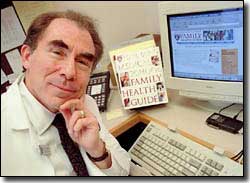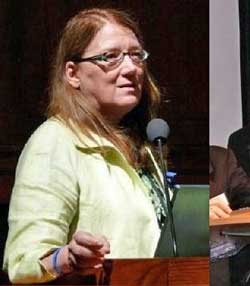The Vote
While the FDA statistical team was highly critical of the drug, the FDA put together a Committee that gave Hemispherx a fighting chance. The Committee included a Patient Advocate who was a patient and CFSAC member (Alaine Perry, MPH), the chair of the federal advisory committee on CFS (CFSAC), Gailen Marshall, MD, Ph.D., the head of the CDC’s CFS program, Dr. Unger, MD, Ph.D., and an ME/CFS researcher and advocate, Dr. Komaroff, MD. The presence of these chronic fatigue syndrome professionals led some to project a close and winning vote for approval.
The biostatisticians were expected to handily vote down the drug with the ME/CFS representatives voting for it and a chunk of others on the fence. Hemispherx knew they needed panel members who could look past the mistakes and changes in study design and focus on the needs of the community. The strong core of ME/CFS professionals was expected, at least by the community, to speak for the needs of the community.
It turned out that, except for Alaine Perry they didn’t. Gailen Marshall voted for approval at every turn but never let loose his at times quite convincing oratory to try and rally support based on the community’s needs. (He and others were told by the FDA not to let moving testimony from the patients to unduly sway their votes.) Two professionals with decades of experience with ME/CFS, Dr. Komaroff, and Dr. Unger, were silent throughout.
Feeling the opportunity slipping away patient advocate, Alaine Perry, pulled out all the stops. Literally stopping the discussion in its tracks she presented a lengthy, moving, and articulate soliloquy on the needs of ME/CFS patients. Her presentation was powerful enough that I wondered if she was going to turn the whole thing around by herself, but it was not to be.
It turned out that the biostatisticians voted down the drug, several key ME/CFS professionals did as well, and Ampligen got support from several members without obvious connections to the disorder..
Critical Votes
Dr. Komaroff and Dr. Unger ended up being the critical votes. Enough other members voted for the drug and if these two members had voted yes, the FDA would have had considerable difficulty not approving the drug in some fashion. Two more yes votes would have made the safety and efficacy votes 7-6 against approval and the summary vote including both safety and efficacy 7-6 for approval plus there was the solid win (9-4) on the vote on whether the safety evidence was good enough for marketing (approval).
Sign the Petition to Approve Ampligen Here
With close votes on whether safety and efficacy had been substantiated, a whopping win indicating that the panel felt the community needs trumped any safety concerns, and a close summary vote for approval, it would have been hard for the FDA not to conditionally approve the drug with restrictions…
That, of course, was not to be and it was primarily because of two votes by ME/CFS professionals. Dr. Komaroff was one of five (of 13 members) not to vote yes once for the drug and Dr. Unger voted once for approval. Dr. Komaroff, of course, has been a champion for ME/CFS for many years. He advocated for it when it was really not popular to do so and continues to present lectures and occasionally author research papers on it. Having a Harvard professor on the ME/CFS bench has always been helpful.
Dr. Komaroff’s history on review committees has been mixed. Early in this disease’s history, he voted for the chronic fatigue syndrome name (he’s regretted it ever since), and as part of a CDC review committee, he strongly supported Dr. Reeve’s CDC CFS program just before the CFSAC committee unanimously voted that Dr. Reeves had to go, and not long before the CDC removed Dr. Reeves from that position. Now he was unable to vote once for Ampligen and was, not surprisingly, confronted by angry patients after the meeting. Dr. Komaroff has, at times, been a great advocate and but I’ll hold my breath if he’s on another review committee for this disorder.
Dr. Unger may have had a more difficult task. As head of the CDC’s CFS program, she was representing the agency and it’s possible she might have had difficulty with her peers voting for a dataset with issues. On the other hand, she’s sat through dozens and dozens of incredibly poignant patient presentations, she knows the cost of this illness, she’s very clear subsets are present – which suggests no drugs are going to work particularly well in clinical trials – and yet she voted against the drug three out of four times.
Dr. Klimas was not on the committee but she represents the view of a physician on the ground and recently released a statement regarding Ampligen on News Medical in which she strongly urged the FDA to approve Ampligen. She stated that “The real loser is not Ampligen, but CFS/ME patients whose daily suffering continues to be unabated”. She noted that mental health or exercise therapies do not get at the heart of ME/CFS and that the finding that subgroup of patients showed marked improvement and that should have been enough. She reminded the FDA that they’d approved MS drugs without biomarkers which had similar success rates as Ampligen. (She also noted there were now 7 approved drugs for MS).
Dr. Klimas noted there were no biomarkers to track success in FDA-approved drugs for MS, and if the Committee had used the same standards they would have approved Ampligen.
“The advisory panel saw MS as a serious disease that required interventions ASAP, and were willing to accept that clinicians would better understand where to use the first drugs with more experience using them. Now there are seven approved drugs for MS that have significantly improved quality of life for patients. But they are not willing to use the same logic for Ampligen.”
She stated she would love to see a conclusive biomarker but, and this is probably the key point, as a physician, she could not agree with the Advisory committee’s votes.
“As a physician, I could live with this decision if I had other effective therapies to treat my CFS/ME patients. But I do not.”
Dr. Bateman also emphasized the poor range of available treatments in her testimony, and it may be this ingrained understanding of the suffering present in the ME/CFS community, bought by years of almost daily interactions with them, that made the difference in how some of the committee members did or didn’t vote.
Big Consequences
The ME/CFS professionals were surely aware of the consequences of their votes. It’s unrealistic to think that after 20 years in the FDA pipeline that Hemispherx – a small drug company with little funding – would simply go out and do another study. If Hemispherx, after all, was unable to respond to an FDA demand three years ago to do a study, why would they be able to do one now? The most likely outcome of the no votes was the end of the road for Ampligen and chronic fatigue syndrome, and that’s what makes Dr. Komaroff’s and Dr. Unger’s votes, in particular, so difficult to swallow.
To my assertion that her no vote was very likely a vote to kill Ampligen permanently for a community with no FDA-approved drugs and no other drugs in sight, an FDA rep simply said that wasn’t any of her business. An FDA that has pledged to do what it can to bring needed drugs to underserved patients might want to put that kind of issue, though, into, their calculations.
Hemispherx has to take responsibility as well. One had the feeling that the FDA investigators simply didn’t trust them. Surely this small company in its first-ever trials, would, in retrospect, have done things differently. They would have been more focused on dotting their i’s and crossing their T’s. The decision to halt a year-long trial that would have provided much stronger data was probably a major error.
In the end, though it was about the drug and the ME/CFS community; this drug is clearly very helpful for some people with ME/CFS and somehow that should have been enough.
The Votes – taken From Kim McCleary’s Research1st post
|
Vote 1 |
Vote 2 |
Vote 3 |
Vote 4 |
|
| Member | Is there substantial evidence of efficacy? | Has safety been adequately assessed? | Is the safety profile adequate for approval? | Do the safety and efficacy data support approval? |
| Lisa Gualtieri, PhD, ScM (R) | No | No | No | No |
| Robert Lahita, MD, PhD (R) | Left early; did not vote | |||
| I Jon Russell, MD, PhD (R) | No | Yes | Yes | No |
| Larry Borish, MD (T) | Yes | No | Yes | Yes |
| Lenore Buckley, MD, PhD (T) | No | No | No | No |
| Ralph D’Agostino, Sr., PhD (T) | No | No | No | No |
| Jacqueline Gardner, MPH, PhD (T) | No | No | Yes | No |
| Sean Hennessy, PharmD, PhD (T) | No | No | Yes | Yes |
| Anthony Komaroff, MD, MA (T) | No | No | No | No |
| Gailen Marshall, Jr., MD, PhD (T) | Yes | Yes | Yes | Yes |
| Alaine Perry, MPH (T) | Yes | Yes | Yes | Yes |
| Matthew Rudorfer, MD (T) | Yes | Yes | Yes | Yes |
| Elizabeth Unger, PhD, MD (T) | No | No | Yes | No |
| James Ware, PhD (T) | No | No | No | No |
| FINAL VOTE | No: 9 Yes: 4 Did not vote: 1 |
No: 9 Yes: 4 Did not vote: 1 |
No: 5 Yes: 8 Did not vote: 1 |
No: 8 Yes: 5 Did not vote: 1 |
A Frustrated Team
Hemispherx employees left the meeting dismayed, frustrated, and stunned. Bob Miller, who was part of the team, relayed that the team felt prepared after lunch to answer the FDA’s questions during the discussion period but didn’t feel they were provided equal chances to do so. They felt critical information was left on the table. I remembered the moderator several times cutting off Hemispherx or not allowing them to present.
Where To Now?
It’s NOT a done deal. Ampligen didn’t win out but it did get a potentially critically yes vote.
While the panel did not vote that Hemispherx had sufficiently proved that Ampligen was effective or safe enough for full approval, they did vote (8-5) that Hemispherx had shown Ampligen was safe enough for ‘marketing’. This means that most of the panel asserted that, given the needs of this population, Hemispherx had provided enough safety data for the community to be given a shot at the drug.
Sign the Petition to Approve Ampligen Here
That’s a huge opening. That’s a prescription forconditional approval with restrictions by the FDA and that was made possible by the huge turnout by the ME/CFS population; a turnout the FDA called overwhelming, a turnout that broke their servers and a turnout that made them very aware of how much this community wants to have access to this drug.
Now, with the FDA in decision-making mode let’s make their decision as a difficult a one as can be. We are a force to be reckoned with. We deserve access to this drug. We know it works. We know every doctor that has used it for the past ten years strongly supports it.
Let’s bring Ampligen home for the ME/CFS Community.
An action and a petition has been started to support Ampligen. Please support the action here and sign the petition here.









Thanks for this, Cort. I’ve been emailing every day since the call came out from you and Bob Miller and I’ve signed the petition.
We’ve got to keep pushing and pushing to get Ampligen approved. It’s not even about getting Ampligen, for me – I live in the UK and even if it was approved by the FDA, our chances of getting it in the immediate future would be slim but I see it as a game-changer. If the FDA approves an immune drug for ME/CFS then that’s a message to the world that we have an immune disease, not a psychiatric one. That alone would have a huge effect on how we’re treated by the media, the public and our doctors, and would open the doors to funding of biomedical research.
It’s hard to understate the importance of this. I hope everyone who reads your piece will start emailing (it only takes a minute) and will sign the petition.
Thanks for these excellent reports.
Has Ampligen been approved in other countries? Do you know which? (it said somewhere that it was safely used in other countries, that’s interesting)
The FDA said at the meeting that Ampligen wouldn’t qualify for conditional approval. Something to do with surrogate vs clinical endpoints. They stated that the data didn’t quite make it.
I inferred that there was no flexibility here.
Can anyone clarify this?
Hi there what a shame we were so hoping to get a drug approved for myalgic encephalomyelitis(ME) maybe those that voted against it would like to explain their reasoning to the ME community. Come on FDA you are meant to be providing healthcare not blocking it. Approve the conditional use of Ampligen given the lack of other drugs available.
Whilst I wish with all my heart for effective CFS treatments, I must say the evidence doesn’t stack up greatly for ampligen – I think peoples’ faith in it is misplaced.
I will be extremely disappointed if this drug is not approved. I had to do the treatment for HEP C for 6 months in 2008. Interferon/Ribavirin. When people talk about side effects believe me I know. But thanks to the good doctors, clinicians, aids and my self determination to rid myself of the disease, I did. It was not a guarantee by any means.
I had to take blood test 4 weeks in. My liver responded perfectly, but I was getting weaker, foggier by the day.
Still no guarantees…It just doesn’t work on everyone. That is why I am hoping the FDA approves it. And let those in the subset at least get help. FDA could monitor it and see how it is being tolerated. If they just say NO-to a drug that is used and does help(off the market) why want they allow it for real. I really hope the President as promised has kept someone looking into the FDA and Ampligen/CFS. I hope the politics of the FDA committee does not interfere with the patients that so desperately need it. A mere 7 votes out of 37 cast left this drug outside the door. I hope the 8-5 vote opened the door for reasonable people to make the right decision. I was a 40 per center, but got 100 percent cured.
Keeping good thougths
Thanks,
One of the things that struck me was the really severe side effects of other approved immune drugs compared to the really quite mild side effects of Ampligen; the committee felt it was safe enough for approval/marketing even if Hemispherx hadn’t given them all the safety data they wanted; I think that’s more than enough – given this communities needs – to approve the drug with restrictions that allow the drug to be marketed and Hemispherx to do the studies the FDA wants.
Cort,
Thank you for the excellent article, but I fear we need the media for ours voices to be heard.
I think you’re probably right April….
Cort,
Are you losing hope?
Robbie